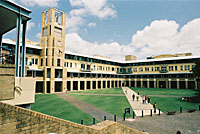| The Emergence of Modern Europe (A) - HIST1011 |
|
|||||||||||||||||||||||||||||||||||||

Description The principal themes in the history of early modern Europe, concentrating on the 16th and 17th centuries. Topics may include modern trends such as the Renaissance, the Protestant Reformation, the Scientific Revolution, the emergence of towns and the centralised absolute state. Discussion may also include the history of climate, disease and population change and their relationship with the environment; social and religious conflicts; and the lives and beliefs of 'ordinary people' in the period, such as witchcraft. For details of topics covered in current year contact the School of History.
Learning Outcomes On completion of this course, students should be able to:
Assessment
|
||||||||||||||||||||||||||||||||||||||

| Contacts | Library | myUNSW | WebCT |